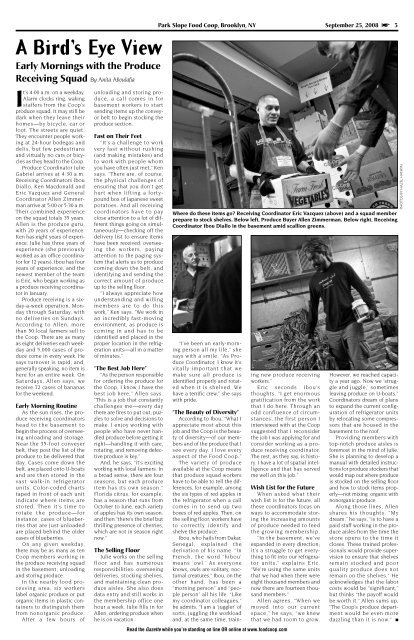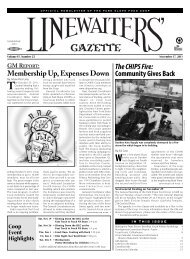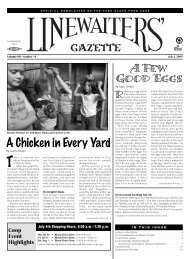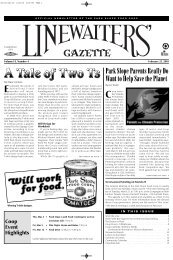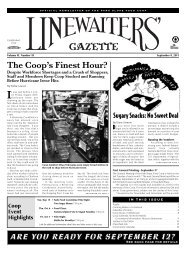September 25th, 2008 : Volume CC, Number 20 - Park Slope Food ...
September 25th, 2008 : Volume CC, Number 20 - Park Slope Food ...
September 25th, 2008 : Volume CC, Number 20 - Park Slope Food ...
You also want an ePaper? Increase the reach of your titles
YUMPU automatically turns print PDFs into web optimized ePapers that Google loves.
<strong>Park</strong> <strong>Slope</strong> <strong>Food</strong> Coop, Brooklyn, NY <strong>September</strong> 25, <strong><strong>20</strong>08</strong> 3<br />
A Bird’s Eye View<br />
Early Mornings with the Produce<br />
Receiving Squad By Anita Aboulafia<br />
It’s 4:00 a.m. on a weekday.<br />
Alarm clocks ring, waking<br />
staffers from the Coop’s<br />
produce squad. It may still be<br />
dark when they leave their<br />
homes—by bicycle, car or<br />
foot. The streets are quiet.<br />
They encounter people working<br />
at 24-hour bodegas and<br />
delis, but few pedestrians<br />
and virtually no cars or bicycles<br />
as they head to the Coop.<br />
Produce Coordinator Julie<br />
Gabriel arrives at 4:30 a.m.<br />
Receiving Coordinators Ibou<br />
Diallo, Ken Macdonald and<br />
Eric Vazquez and General<br />
Coordinator Allen Zimmerman<br />
arrive at 5:00 or 5:30 a.m.<br />
Their combined experience<br />
on the squad totals 35 years.<br />
Allen is the produce guru,<br />
with <strong>20</strong> years of experience.<br />
Ken has eight years of experience;<br />
Julie has three years of<br />
experience (she previously<br />
worked as an office coordinator<br />
for 12 years). Ibou has four<br />
years of experience, and the<br />
newest member of the team<br />
is Eric, who began working as<br />
a produce receiving coordinator<br />
in January.<br />
Produce receiving is a sixday-a-week<br />
operation, Monday<br />
through Saturday, with<br />
no deliveries on Sundays.<br />
According to Allen, more<br />
than 50 local farmers sell to<br />
the Coop. There are as many<br />
as eight deliveries each weekday<br />
and 5,000 cases of produce<br />
come in every week. He<br />
says turnover is rapid, and,<br />
generally speaking, no item is<br />
here for an entire week. On<br />
Saturdays, Allen says, we<br />
receive 72 cases of bananas<br />
for the weekend.<br />
Early Morning Routine<br />
As the sun rises, the produce<br />
receiving coordinators<br />
head to the basement to<br />
begin the process of overseeing<br />
unloading and storage.<br />
Near the 35-foot conveyer<br />
belt, they post the list of the<br />
produce to be delivered that<br />
day. Cases come down the<br />
belt, are placed onto U-boats<br />
and are then stored in the<br />
vast walk-in refrigerator<br />
units. Color-coded charts<br />
taped in front of each unit<br />
indicate where items are<br />
stored. Then it’s time to<br />
rotate the produce—for<br />
instance, cases of blueberries<br />
that are just unloaded<br />
are placed behind the older<br />
cases of blueberries.<br />
On any given weekday,<br />
there may be as many as ten<br />
Coop members working in<br />
the produce receiving squad<br />
in the basement, unloading<br />
and storing produce.<br />
In the nearby food processing<br />
area, six workers<br />
label organic produce or put<br />
organic items in plastic containers<br />
to distinguish them<br />
from nonorganic produce.<br />
After a few hours of<br />
unloading and storing produce,<br />
a call comes in for<br />
basement workers to start<br />
sending items up the conveyor<br />
belt to begin stocking the<br />
produce section.<br />
Fast on Their Feet<br />
“It’s a challenge to work<br />
very fast without rushing<br />
(and making mistakes) and<br />
to work with people whom<br />
you have often just met,” Ken<br />
says. “There are, of course,<br />
the physical challenges of<br />
ensuring that you don’t get<br />
hurt when lifting a fortypound<br />
box of Japanese sweet<br />
potatoes. And all receiving<br />
coordinators have to pay<br />
close attention to a lot of different<br />
things going on simultaneously—checking<br />
off the<br />
delivery list to ensure items<br />
have been received, overseeing<br />
the workers, paying<br />
attention to the paging system<br />
that alerts us to produce<br />
coming down the belt, and<br />
identifying and sending the<br />
correct amount of produce<br />
up to the selling floor.<br />
“I always appreciate how<br />
understanding and willing<br />
members are to do this<br />
work,” Ken says. “We work in<br />
an incredibly fast-moving<br />
environment, as produce is<br />
coming in and has to be<br />
identified and placed in the<br />
proper location in the refrigeration<br />
units—all in a matter<br />
of minutes.”<br />
“The Best Job Here”<br />
“As the person responsible<br />
for ordering the produce for<br />
the Coop, I know I have the<br />
best job here,” Allen says.<br />
“This is a job that constantly<br />
challenges me—every day<br />
there are fires to put out, puzzles<br />
to solve and decisions to<br />
make. I enjoy working with<br />
people who have never handled<br />
produce before getting it<br />
right—handling it with care,<br />
rotating, and removing defective<br />
produce is key.”<br />
And, he says, “it’s exciting<br />
working with local farmers. In<br />
a broad sense, there are four<br />
seasons, but each produce<br />
item has its own season.”<br />
Florida citrus, for example,<br />
has a season that runs from<br />
October to June, each variety<br />
of apples has its own season,<br />
and then “there’s the brief but<br />
thrilling presence of cherries,<br />
which are not in season right<br />
now.”<br />
The Selling Floor<br />
Julie works on the selling<br />
floor and has numerous<br />
responsibilities: overseeing<br />
deliveries, stocking shelves,<br />
and maintaining clean produce<br />
aisles. She also does<br />
data entry and still works in<br />
the membership office one<br />
hour a week. Julie fills in for<br />
Allen, ordering produce when<br />
he is on vacation.<br />
Where do these items go Receiving Coordinator Eric Vazquez (above) and a squad member<br />
prepare to stock shelves. Below left, Produce Buyer Allen Zimmerman. Below right, Receiving<br />
Coordinator Ibou Diallo in the basement amid scallion greens.<br />
“I’ve been an early-morning<br />
person all my life,” she<br />
says with a smile. “As Produce<br />
Coordinator, I know it’s<br />
vitally important that we<br />
make sure all produce is<br />
identified properly and rotated<br />
when it is shelved. We<br />
have a terrific crew,” she says<br />
with pride.<br />
“The Beauty of Diversity”<br />
According to Ibou, “What I<br />
appreciate most about this<br />
job and the Coop is the beauty<br />
of diversity—of our members<br />
and of the produce that I<br />
see every day. I love every<br />
aspect of the <strong>Food</strong> Coop.”<br />
The variety of produce<br />
available at the Coop means<br />
that produce squad workers<br />
have to be able to tell the differences,<br />
for example, among<br />
the six types of red apples in<br />
the refrigerator when a call<br />
comes in to send up two<br />
boxes of red apples. Then, on<br />
the selling floor, workers have<br />
to correctly identify and<br />
shelve the produce.<br />
Ibou, who hails from Dakar,<br />
Senegal, explained the<br />
derivation of his name. “In<br />
French, the word ‘hibou’<br />
means ‘owl.’ As everyone<br />
knows, owls are solitary, nocturnal<br />
creatures.” Ibou, on the<br />
other hand, has been a<br />
“morning person” and “people<br />
person” all his life. “Like<br />
my coordinator colleagues,”<br />
he admits, “I am a ‘juggler’ of<br />
sorts, juggling the workload<br />
and, at the same time, training<br />
new produce receiving<br />
workers.”<br />
Eric seconds Ibou’s<br />
thoughts. “I get enormous<br />
gratification from the work<br />
that I do here. Through an<br />
odd confluence of circumstances,<br />
the first person I<br />
interviewed with at the Coop<br />
suggested that I reconsider<br />
the job I was applying for and<br />
consider working as a produce<br />
receiving coordinator.<br />
The rest, as they say, is history.<br />
I have a lot of spatial intelligence<br />
and that has served<br />
me well on this job.”<br />
Wish List for the Future<br />
When asked what their<br />
wish list is for the future, all<br />
these coordinators focus on<br />
ways to accommodate storing<br />
the increasing amounts<br />
of produce needed to feed<br />
the growing membership.<br />
“In the basement, we’ve<br />
expanded in every direction;<br />
it’s a struggle to get everything<br />
to fit into our refrigerator<br />
units,” explains Eric.<br />
“We’re using the same units<br />
that we had when there were<br />
eight thousand members and<br />
now there are fourteen thousand<br />
members.”<br />
Allen agrees. “When we<br />
moved into our current<br />
space,” he says, “we knew<br />
that we had room to grow.<br />
However, we reached capacity<br />
a year ago. Now we ‘struggle<br />
and juggle,’ sometimes<br />
leaving produce on U-boats.”<br />
Coordinators dream of plans<br />
to expand the current configuration<br />
of refrigerator units<br />
by relocating some compressors<br />
that are housed in the<br />
basement to the roof.<br />
Providing members with<br />
top-notch produce aisles is<br />
foremost in the mind of Julie.<br />
She is planning to develop a<br />
manual with detailed instructions<br />
for produce stockers that<br />
would map out where produce<br />
is stocked on the selling floor<br />
and how to stock items properly—not<br />
mixing organic with<br />
nonorganic produce.<br />
Along those lines, Allen<br />
shares his thoughts. “My<br />
dream,” he says, “is to have a<br />
paid staff working in the produce<br />
aisles from the time the<br />
store opens to the time it<br />
closes. These trained professionals<br />
would provide supervision<br />
to ensure that shelves<br />
remain stocked and poor<br />
quality produce does not<br />
remain on the shelves.” He<br />
acknowledges that the labor<br />
costs would be “significant,”<br />
but thinks “the payoff would<br />
be worth it.” Allen sums up,<br />
“The Coop’s produce department<br />
would be even more<br />
dazzling than it is now.” ■<br />
PHOTOS BY HAZEL HANKIN<br />
Read the Gazette while you’re standing on line OR online at www.foodcoop.com


